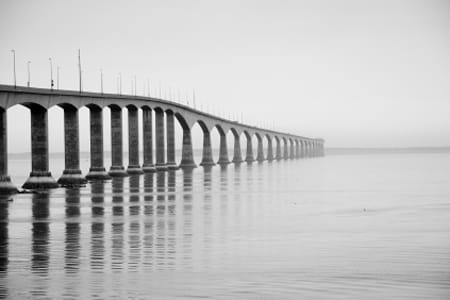I went to PEI to speak about one thing, and came home pondering another.
This autumn took me to Summerside, PEI, to speak at the Eptek Art and Culture Centre. It was a grey day as I drove across the Confederation Bridge. Out of sight of land, yet not at sea, I thought of how the ancient Polynesians navigated the Pacific, sometimes several hundred miles from shore. Without compass or chronometer, they set forth confident they would reach land.
How did those Polynesians manage such a great feat of navigation? The answer is one for the birds. It's thought that, before leaving home, they would capture frigate birds, finding them perched on cliffs or in trees. Although these birds are classified as seabirds, they can neither swim nor take off from a flat surface. What's more, once aloft they can remain airborne for a week or longer. Since the bird could not land on water, it would head for the nearest land. All our Polynesian paddlers had to do was head in the same direction as that taken by their avian trailblazer.
I felt a bit like those oarsmen, except that my frigate bird was the cement wall indicating the way to my destination. Where my path diverged, though, is that I went to speak about one thing and came home pondering another.

A large audience came to the Eptek Centre to hear about the historical and psychological underpinnings in the search for roots. People find this topic fascinating, perhaps because the rate of change has accelerated exponentially in the past century; institutions have been challenged, altered beyond recognition, or scrapped. Lifestyles have overtaken lives. A sense of belonging has been overwhelmed by a feeling of being adrift without a compass, never mind a frigate bird.
We dwellers in the industrialized, homogenizing West sometimes find ourselves in need of something to tell us who we are. Our family history is one thing that each of us possesses in some form or other. By finding out who we come from, and the lives of those people, we find a more secure sense of self.
That evening in Summerside, a few blocks from the MacNaught History Centre where Islanders can go to research their ancestors, I felt like I had caught a mood - a willingness to consider the big picture of genealogical endeavours. People have begun to move beyond the collection of names and dates, which matter greatly, but of themselves present lives not as stories, but as compilations of facts.
When a talk concludes there is a lull while people digest what they have heard, formulating their comments or questions. The speaker gulps a drink of water in preparation for what I think of as the "good part."
Of all the questions asked that night, one brought home to me the fact that the Garden of the Gulf could be called the Land of Cousins: "Have you any family connections on Prince Edward Island?" (Thank goodness I did, because otherwise I'd have been a complete come-from-away!) It sounds basic, yet it is filled with meaning.
Once you start discovering cousinhood, you encounter the phenomenon known as "implex." You have two parents, four grandparents, then on to eight, 16, 32.... If each couple had three children who grew up and got married, and each of them did the same, you realize that somewhere in the past, bloodlines will have crossed. If not, we humans would have been crowded off this planet centuries ago.
What this means is that we are each our own cousin, as well as the cousin of virtually everyone else on Earth, if we go back far enough and look wide enough. In addition to trashing the social construct that one race is better than another, this should reassure people that they don't have to worry about having had millions of ancestors alive at the same time a thousand years ago.
Implex refers to the fact that each time you find a cousin marriage in your ancestry, no matter how remotely related to one another they were, you reduce the doubling effect of the number of ancestors you can actually claim. If you do some math, you will observe that the chances of any other person being your cousin grow greater, not less, as you go back in time.
My visit to Prince Edward Island reminded me of that.
